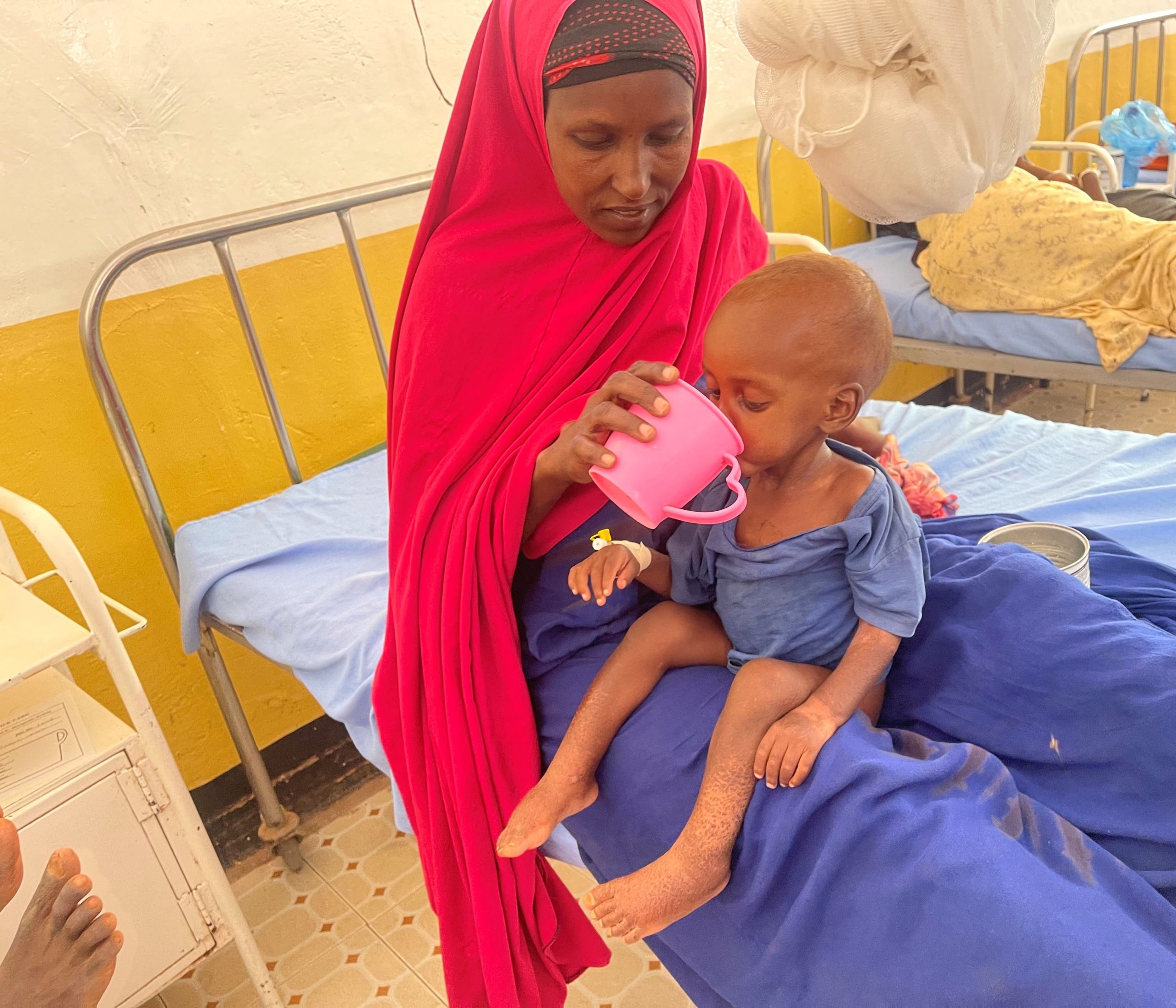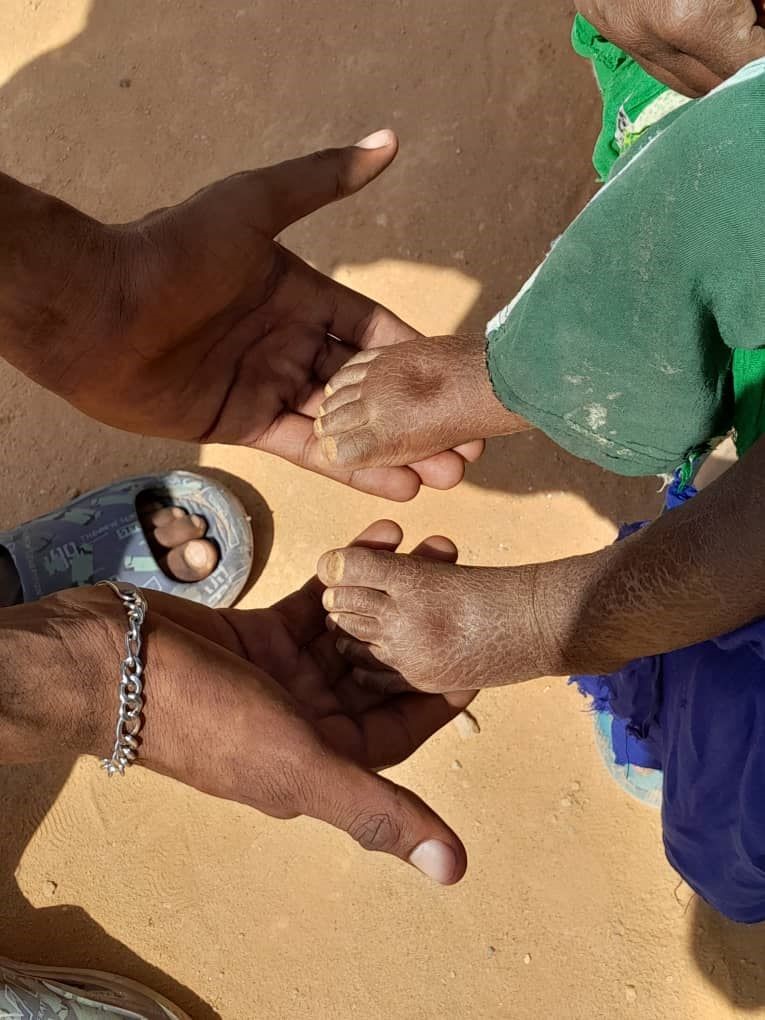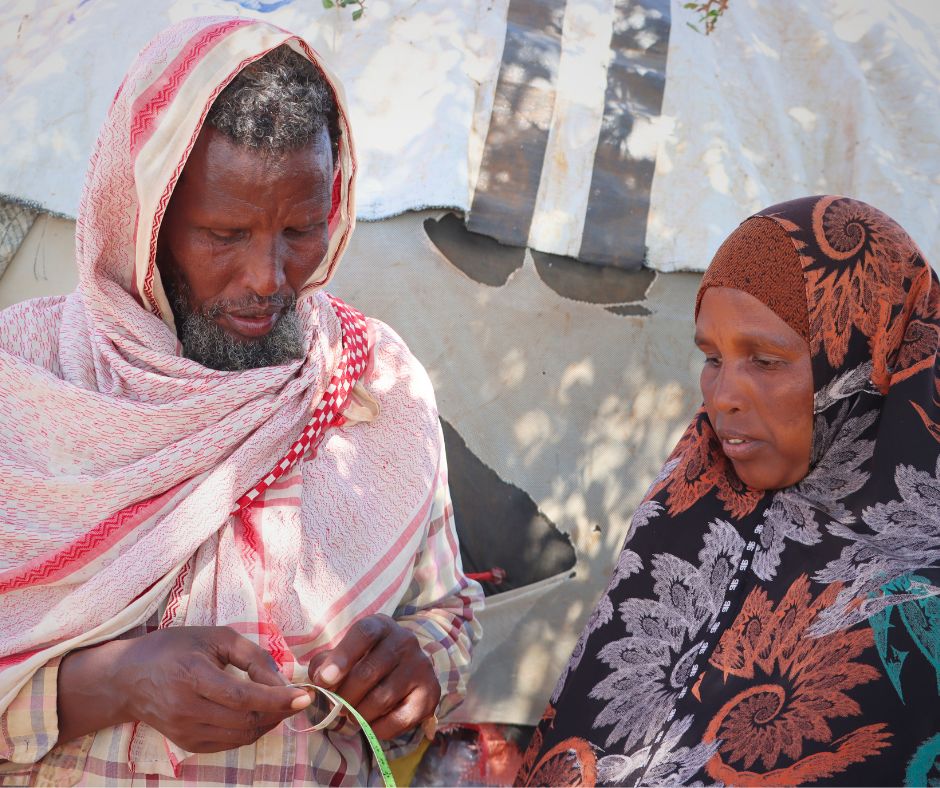Hassan recovered from the severely acute malnutrition and is still on ready-to-use therapeutic food (RUTF) and his mother, Hawa is now a happy mother.
The family of Hawa, her son Hassan and elderly mother, Mama Fowzia, were among the hundreds of families who faced significant hardships when their means of livelihood were seized in a conflict in Mareeri, a village near Qansah Dhere in the southern Bay region of Somalia. Hawa vividly remembers, “The deafening sounds of gunfire left deep scars; some of our neighbors lost their loved ones. Our land was forcefully taken away from us.”
Left with no alternatives, they embarked on a tiring 135-kilometer journey to seek refuge in a camp located in Dolow District. “After enduring a twelve-day non-stop journey on a donkey cart, we finally reached the camp, physically and emotionally exhausted. Upon our arrival, we were provided shelter by the camp leaders. They also informed us about the nearby healthcare facility and connected us with the Camp Coordination and Camp Management (CCCM) team, as well as other organizations that offered us vital assistance such as food vouchers and financial support,” Hawa recounts wearily.
Hassan, who was already in poor health, required immediate healthcare services. He was referred from the camp they resided by a community health worker in to the Dollow Referral Health Centre, operated by Trocaire. Upon screening at the health center, Hassan was diagnosed with severe acute malnutrition and a respiratory tract infection, prompting his urgent admission to the stabilization center for necessary treatment.
His Mid-Upper Arm Circumference (MUAC) measured at 10.5 cm, and his weight was recorded as 8.45 kg, both indicating significantly low readings for his age. He had missed out on receiving immunizations to safeguard against preventable childhood illnesses since his mother delivered him at home without accessing any prenatal care services. During his admission, he had exceeded the recommended age for routine immunizations.

Young Hassan requires several days of treatment at the stabilization center, which is overseen by Trocaire, in order to regain weight and restore his energy.
He began receiving medication for the respiratory tract infection, and therapeutic milk was administered at various stages of his treatment, with his progress closely monitored. He was also administered the measles vaccination, along with vitamin A supplementation and Albendazole for deworming.
After ten days at the Stabilization Center (SC), Hassan’s health began to improve. He was discharged with a MUAC measurement of 11.2 cm and a weight of 9.3 kg. To facilitate his recovery and reduce the risk of relapse, Hawa’s family was linked to a one-month food assistance program aimed at providing support and preventing malnutrition in Hassan and other children under the age of five. The Community Health Workers (CHWs) in the camp continued to regularly monitor Hassan’s progress as part of their ongoing follow-up for patients treated at the healthcare facilities and during outreach mobile clinics.
Hawa’s mother, Fowzia Hussein, also benefited from healthcare services. Fowzia had been struggling with ulcers, diabetes, and hypertension, all of which were exacerbated by the challenging and exhausting journey they undertook with limited access to food. Her elevated blood sugar levels and complicated hypertension led to her admission at the Dollow Referral Health Centre (DRHC). After four days of treatment, her condition stabilized, and she was discharged.
The combined efforts of the healthcare professionals and support systems played a vital role in Hassan’s progress and Fowzia’s recovery, exemplifying the positive impact of accessible healthcare services in challenging circumstances. The referral hospital, along with the integrated health and nutrition services, receives funding from the European Union Humanitarian Aid (EU ECHO) through the Caafimaad Plus Consortium, which includes Trocaire and seven other organizations.
I am deeply grateful that my son has regained his health, thanks to the dedicated staff who connected him to life-saving healthcare services when we needed it most. Additionally, my mother was battling diabetes, ulcers, and complicated hypertension, and she received excellent care at the facility. She’s now doing very well, all thanks to the committed facility staff, the organization, and the generous donors,” Hawa said.
Furthermore, Hassan was linked to Trocaire-supported outpatient treatment programme, where he collected his weekly supplies of ready-to-use therapeutic food (RUTF). Later, he was enrolled in the Targeted Supplementary Feeding Program (TSFP) to continue his treatment as an outpatient.
In efforts to raise awareness and educate the community, members were provided with guidance on identifying protection threats and referring cases to a designated protection focal point. Additionally, the community received education on various health-related topics, including child spacing, infant and young child feeding (IYCF) practices, and immunization. These efforts have positively influenced people’s perspectives and dispelled misconceptions and fears.








